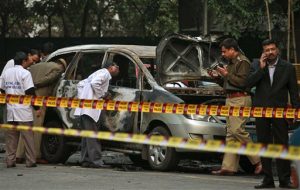A January 29 bombing outside the Israeli Embassy in New Delhi continues to raise more questions than answers it provides.
On Friday, a “very low intensity improvised device,” as the Delhi Police described it, went off outside the embassy, damaging cars but not causing injuries or harm to the diplomatic compound. The Delhi Police was quick to downplay the incident at first, noting in a statement that “[i]nitial impressions suggest a mischievous attempt to create a sensation.” However, Israeli authorities have maintained from the get-go that this was a terrorist attack, a claim that assumes certain salience given another attack in February 2012 when the Israeli defense attaché’s wife was injured in a bombing in India’s capital. It is widely believed that Iran was behind this attack.
More recent reporting by well-connected Indian journalists does lend credence to the Israeli claims as Indian authorities begin to suspect Iranian involvement, even though they are unlikely to go on record, given New Delhi’s long ties with Tehran. According to the Hindustan Times’ Shishir Gupta on January 31, Indian security officials believe that the needle of suspicion about the perpetrators of Friday’s bomb attack points toward Iran, despite emergence of a claim of responsibility by “Jaish-Ul-Hind,” an unknown group, on a messaging app.
A letter written in English, addressed to the Israeli Ambassador Ron Malka, was also found from the scene of the explosion. The poorly crafted letter swore revenge for the death of top Islamic Revolutionary Guard Corps commander Qassem Soleimani in January last year following a U.S. drone strike outside Baghdad airport, and the assassination of Iranian nuclear expert Mohsen Fakhrizadeh in an attack in November outside Tehran. It called Friday’s attack a “trailer.” While on the face of it the letter does suggest an Iran link to Friday’s attack, it sits uneasily with the claim posted by Jaish-Ul-Hind on Telegram — claim experts believe to be almost certainly bogus given that the group appears to have emerged from nowhere.
However, the veracity of the letter to Malka can also be questioned. If the attack was a message to the Israeli government that Tehran can target Jerusalem’s interests across the world, it would hardly be in Iran’s interest to so manifestly undermine plausible deniability by leaving a letter addressed to the ambassador on the attack site. Rather, a more sophisticated approach would be to stage an attack with a “signature” that would be unmistakable for Israeli authorities.
The plot also thickened with reports emerging that Friday’s attack may indeed have been more serious in its intent than initially suspected. Reporting for News18 on January 31, Praveen Swami quoted an unnamed senior Indian intelligence official as saying: “There’s the distinct possibility that whoever carried out the act had carried out reconnaissance on the movement of these diplomatic officials, and timed the explosion accordingly.” According to Swami’s reporting, Israeli diplomats typically leave the embassy compound around 5 p.m. – which is when the explosion occurred. On Friday, they had been delayed due to a meeting running over time. “Anyone near the bomb when it went off would likely have been killed or maimed,” Swami quoted a forensic expert with knowledge of the investigation as saying.
It is extremely unlikely that we would ever get an official Indian confirmation about Iranian involvement in Friday’s attack, if that was indeed the case – or whether it will indeed be possible for Indian security services to make a firm case in that direction. For the moment, the attack is likely to further complicate India-Iran ties, which have come under strain in the recent years due to a dramatic downturn in commercial relations between the two countries following the reinstatement of U.S. sanctions against Iran in 2018.

































